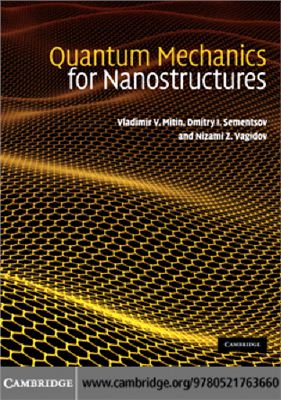Cambridge University Press, 2010. - 431 pp.
The properties of new nanoscale materials, their fabrication and applications, as well as the operational principles of nanodevices and systems, are solely determined by quantum-mechanical laws and principles. This textbook introduces engineers to quantum mechanics and the world of nanostructures, enabling them to apply the theories to numerous nanostructure problems.
The book covers the fundamentals of quantum mechanics, including uncertainty relations, the Schrodinger equation, perturbation theory, and tunneling. These are then applied to a quantum dot, the smallest artificial atom, and compared with the case of hydrogen, the smallest atom in nature. Nanoscale objects with higher dimensionality, such as quantum wires and quantum wells, are introduced, as well as nanoscale materials and nanodevices. Numerous examples throughout the text help students to understand the material.
The properties of new nanoscale materials, their fabrication and applications, as well as the operational principles of nanodevices and systems, are solely determined by quantum-mechanical laws and principles. This textbook introduces engineers to quantum mechanics and the world of nanostructures, enabling them to apply the theories to numerous nanostructure problems.
The book covers the fundamentals of quantum mechanics, including uncertainty relations, the Schrodinger equation, perturbation theory, and tunneling. These are then applied to a quantum dot, the smallest artificial atom, and compared with the case of hydrogen, the smallest atom in nature. Nanoscale objects with higher dimensionality, such as quantum wires and quantum wells, are introduced, as well as nanoscale materials and nanodevices. Numerous examples throughout the text help students to understand the material.

